A U.S. Senate committee approved a bipartisan bill Wednesday that seeks to accelerate planning at international financial institutions for Venezuela's reconstruction.
The measure adopt also would authorize $400 million in new humanitarian assistance and formally recognize and support efforts by Venezuelan opposition leader Juan Guaidó to restore democracy.
The Senate Foreign Relations Committee amended the measure to include three bills approved in March by the House of Representatives to expand U.S. humanitarian assistance in Venezuela, prohibit U.S. arm sales to the government of President Nicolás Maduro, and counter Russia's presence and influence in the South American country.
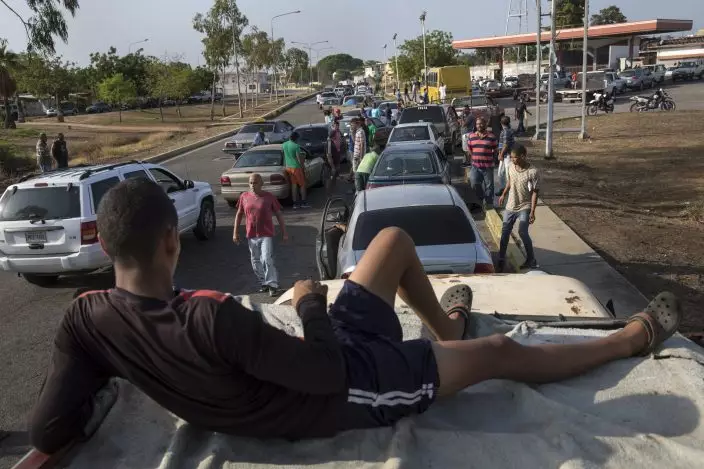
People line the street with their vehicles as they wait to fill up with gas at a fuel station, top right, in Cabimas, Venezuela, Wednesday, May 15, 2019. U.S. sanctions on oil-rich Venezuela appear to be taking hold, resulting in mile-long lines for fuel in the South American nation’s second-largest city, Maracaibo. (AP PhotoRodrigo Abd)
The legislation now moves forward to be considered by the full Senate.
Democratic Sen. Bob Menendez of New Jersey and Republican Sen. Marco Rubio of Florida called the proposal the most comprehensive legislative effort to date to confront the crisis in Venezuela.
The governments of the United States and about 50 other countries recognize Guaidó as the legitimate leader of Venezuela, saying they consider Maduro's re-election last year fraudulent because strong opposition candidates were prevented from running.
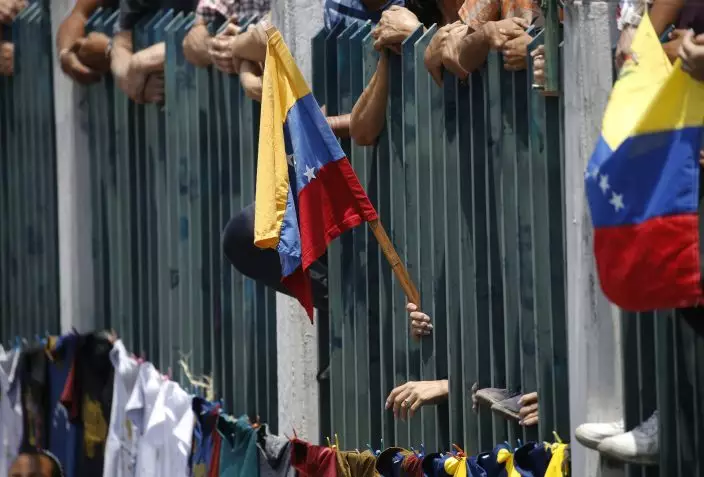
A supporter of Venezuela's opposition leader and self-proclaimed interim president Juan Guaidó gholds a national flag at a rally in Guatire, Venezuela, Saturday, May 18, 2019. (AP PhotoAriana Cubillos)
The House Judiciary Committee was poised Wednesday to debate a separate bill that seeks to protect Venezuelan citizens currently living in the United States from deportation by granting them temporary protected status.
A corresponding TPS bill has also been introduced in the Senate. A group of 23 Democratic senators and Rubio sent a letter in March to President Donald Trump asking him to give the protection to more than 70,000 Venezuelans in the U.S.
Temporary protected status is granted to people from countries ravaged by natural disasters or war and lets them remain in the U.S. until the situation improves back home. About 300,000 people have received those protections.
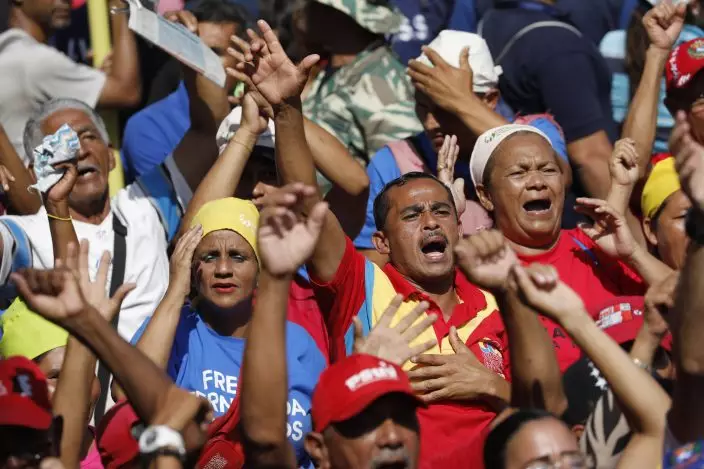
Militia members and supporters of Venezuela's President Nicolas Maduro sing an anthem to late former President Hugo Chavez, outside Miraflores presidential palace in Caracas, Venezuela, Monday, May 20, 2109. Maduro is celebrating the anniversary of his disputed re-election amid a growing humanitarian crisis and political upheaval. (AP PhotoAriana Cubillos)
But the Trump administration has moved to discontinue that specific protection for many countries and it has not publicly addressed the possibility of conceding TPS to Venezuelans.
"We requested asylum three years ago and have not received a response yet. We need another option such as TPS," Venezuelan migrant Ricardo Calleja told The Associated Press.
Calleja, who attended the House hearing, left Venezuela for Baltimore in 2016 with his wife and two young sons.
Luis Alonso Lugo on Twitter: http://www.twitter.com/luisalonsolugo
SEOUL, South Korea (AP) — The United States and its allies are discussing options “both inside and outside the U.N. system” to create a new mechanism for monitoring North Korea over its nuclear weapons program, the American ambassador to the United Nations said Wednesday.
Russia last month vetoed a U.N. resolution in a move that effectively abolished monitoring by U.N. experts of Security Council sanctions against North Korea, which prompted Western accusations that Moscow was acting to shield its arms purchases from North Korea to fuel its war in Ukraine.
“I look forward to engaging with both the Republic of Korea and Japan, but like-minded (countries) as well, on trying to develop options both inside the U.N. as well as outside the U.N. The point here is that we cannot allow the work that the panel of experts were doing to lapse,” U.S. Ambassador Linda Thomas-Greenfield told a news conference in Seoul, using the formal name for South Korea.
Thomas-Greenfield didn’t provide specific details about U.S. discussions with allies and other partners, including whether an alternative monitoring regime would more likely be established through the U.N. General Assembly or with an independent entity outside of the U.N.
Thomas-Greenfield met with South Korean Foreign Minister Cho Tae-yul on Monday and they discussed unspecified “next steps to ensure a continuation of independent and accurate reporting” of North Korea’s illicit weapons development activities, according to her office.
Thomas-Greenfield said it was clear that Russia and China, which abstained from voting on the U.N. resolution vetoed by Moscow, will continue to try to block international efforts to maintain monitoring of U.N. sanctions against North Korea. She criticized Russia for violating those sanctions with its alleged arms purchases from North Korea, and China for protecting the North from being held accountable.
Moscow and Beijing have thwarted U.S.-led efforts to tighten U.N. sanctions on North Korea over its ramped-up ballistic missile testing since 2022, underscoring a divide between permanent Security Council members that deepened over Russia’s war on Ukraine.
“I don’t expect that they will cooperate or agree with any efforts that we make to find another path, but that is not going to stop us from finding that path moving forward,” Thomas-Greenfield said.
Thomas-Greenfield also briefly addressed questions about tensions in the Middle East. When asked about the Palestinian Authority's request to have full U.N. membership, she said a U.N resolution in support of that request would not contribute to finding a two-state solution to the Israeli-Palestinian conflict.
“President Biden has said categorically that we support a two-state solution for addressing the situation in the Middle East, where Palestinians will have a state of their own and Israel is secure in their state, and we are working on the ground to get to that place as quickly as possible,” she said.
“We do not see that doing a resolution in the Security Council will necessarily get us to a place where we can find a ... two-state solution moving forward," she added.
Tensions on the Korean Peninsula are at their highest point in years, as North Korean leader Kim Jong Un has accelerated his weapons demonstrations and issued provocative threats of nuclear conflict against rivals.
The United States, South Korea and Japan have responded by expanding their combined military exercises and sharpening their nuclear deterrence strategies built around strategic U.S. assets.
In a telephone conversation on Wednesday, South Korean President Yoon Suk Yeol and Japanese Prime Minister Fumio Kishida agreed to further strengthen three-way cooperation with Washington to counter North Korean threats and other regional challenges amid “deepening uncertainties in the international situation,” Yoon’s office said.
The Security Council imposed sanctions after North Korea’s first nuclear test explosion in 2006 and tightened them over the years in a total of 10 resolutions seeking — so far unsuccessfully — to cut funds and curb its nuclear and missile programs. The last sanctions resolution was adopted by the council in December 2017.
The Security Council established a committee to monitor sanctions, and the mandate for its panel of experts to investigate violations had been renewed for 14 years until last month.
Russia’s U.N. Ambassador Vassily Nebenzia told the Security Council before last month’s vote that Western nations are trying to “strangle” North Korea and that sanctions are losing their “relevance” in preventing the proliferation of nuclear weapons in the North.
In its most recent report circulated last month, the panel of experts said it is investigating 58 suspected North Korean cyberattacks between 2017 and 2023 valued at approximately $3 billion, with the money reportedly being used to help fund its weapons development.
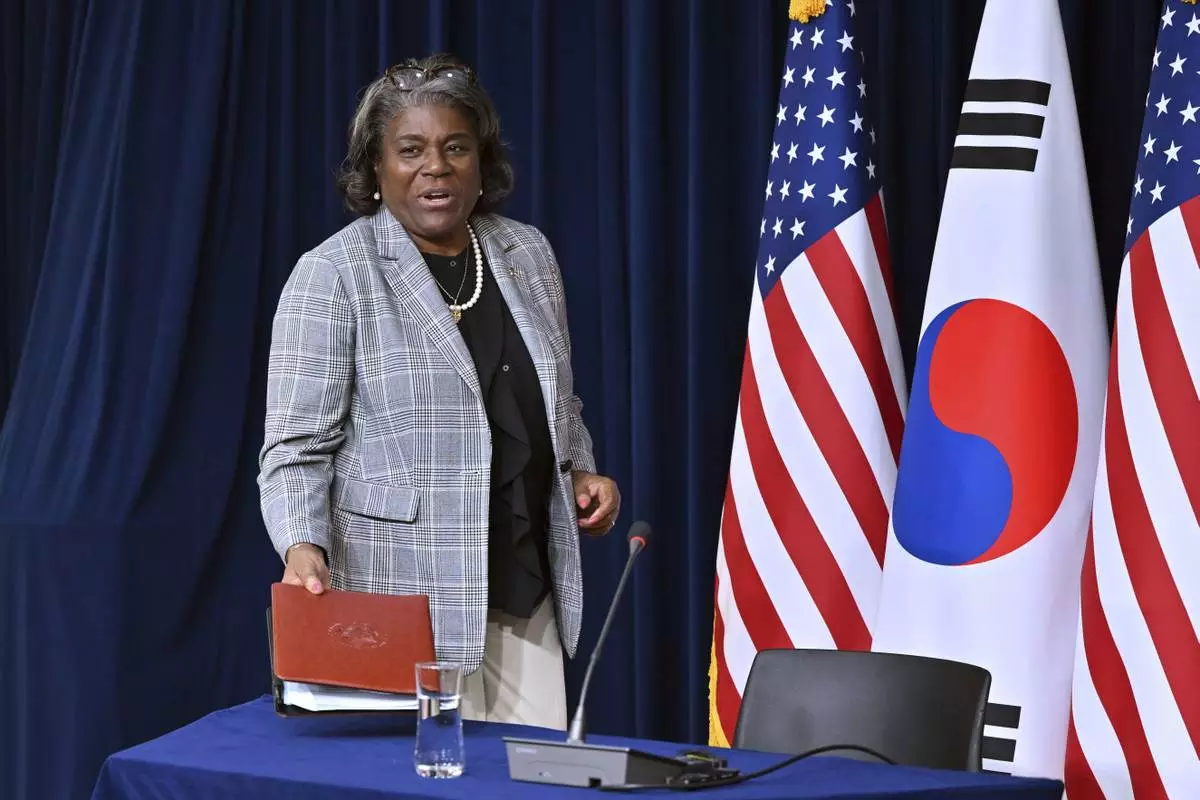
U.S. Ambassador to the United Nations Linda Thomas-Greenfield arrives to attend a press conference at the American Diplomacy House in Seoul Wednesday, April 17, 2024. (Jung Yeon-je/Pool Photo via AP)
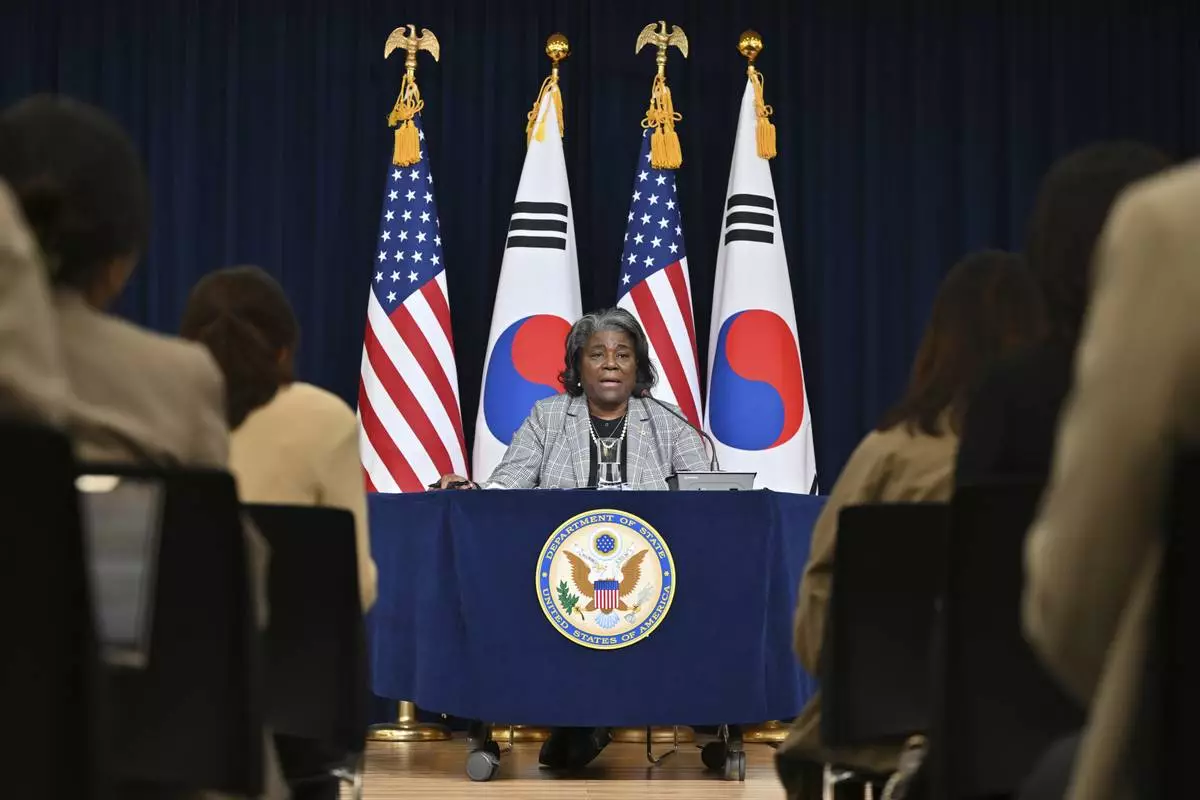
U.S. Ambassador to the United Nations Linda Thomas-Greenfield speaks during a press conference at the American Diplomacy House in Seoul Wednesday, April 17, 2024. (Jung Yeon-je/Pool Photo via AP)
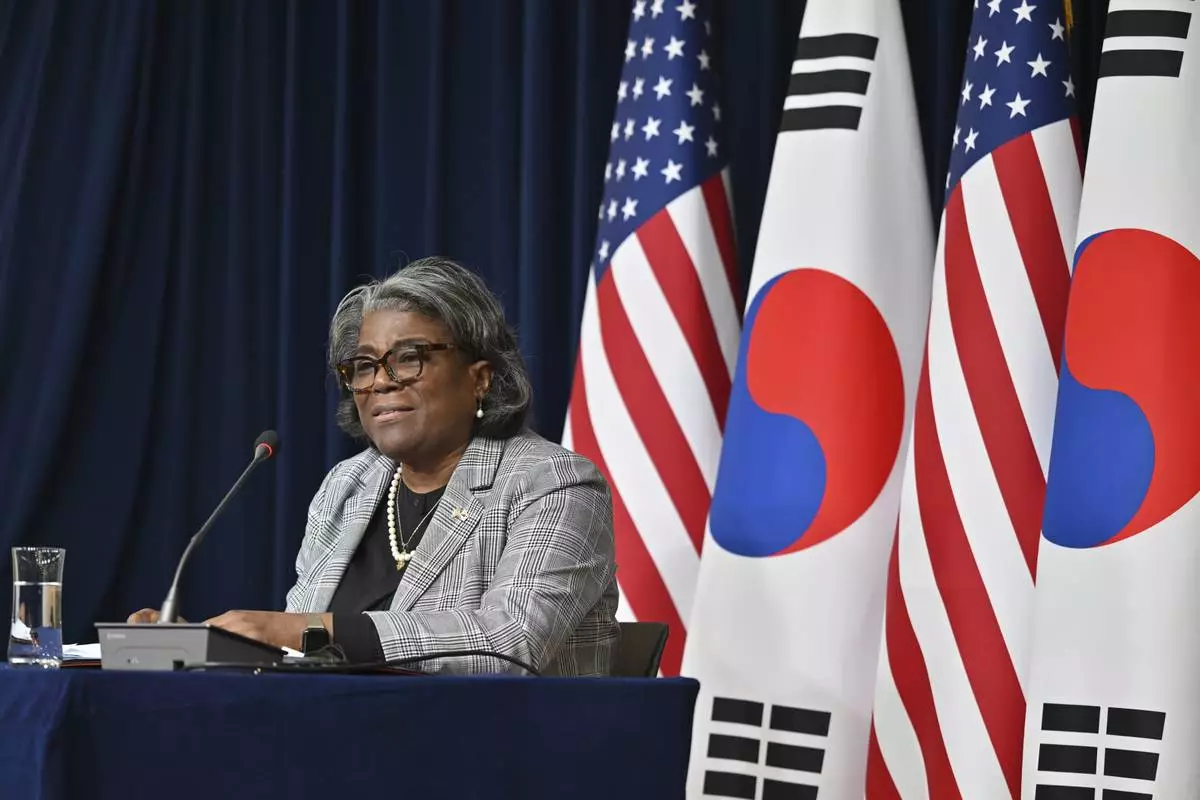
U.S. Ambassador to the United Nations Linda Thomas-Greenfield speaks during a press conference at the American Diplomacy House in Seoul Wednesday, April 17, 2024. (Jung Yeon-je/Pool Photo via AP)
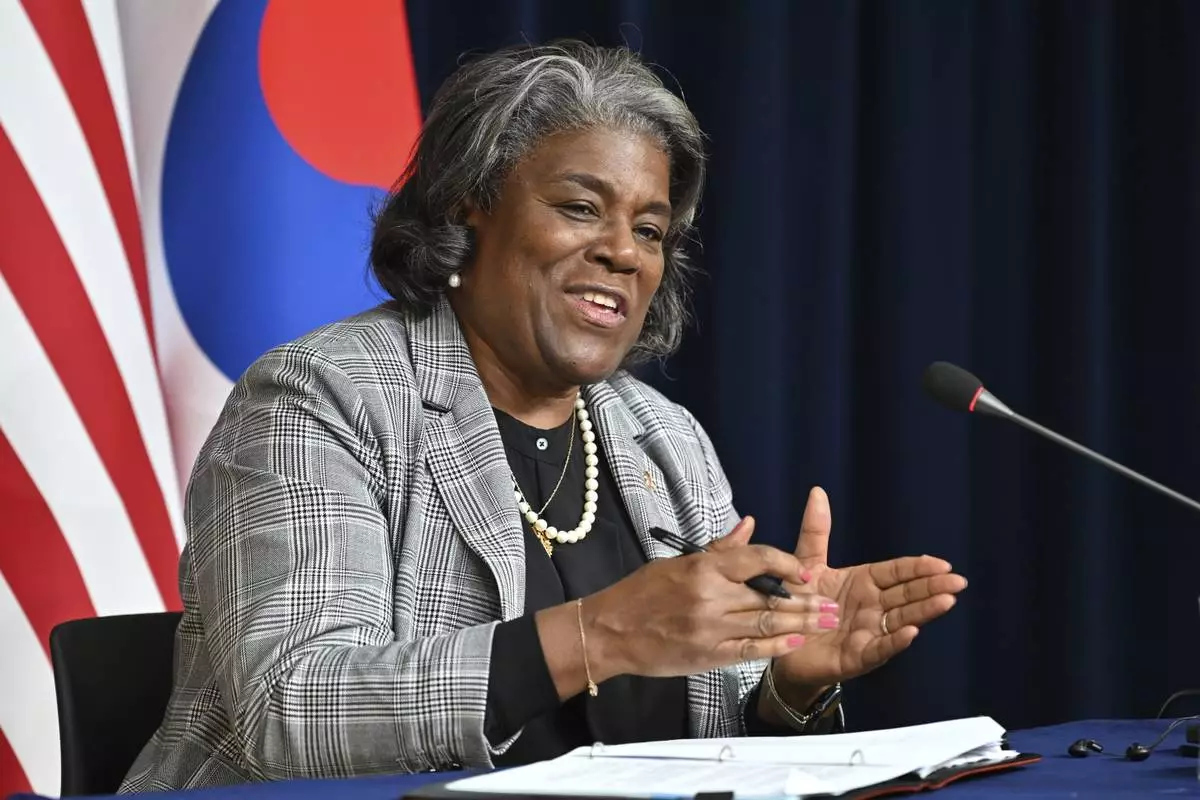
U.S. Ambassador to the United Nations Linda Thomas-Greenfield speaks during a press conference at the American Diplomacy House in Seoul Wednesday, April 17, 2024. (Jung Yeon-je/Pool Photo via AP)
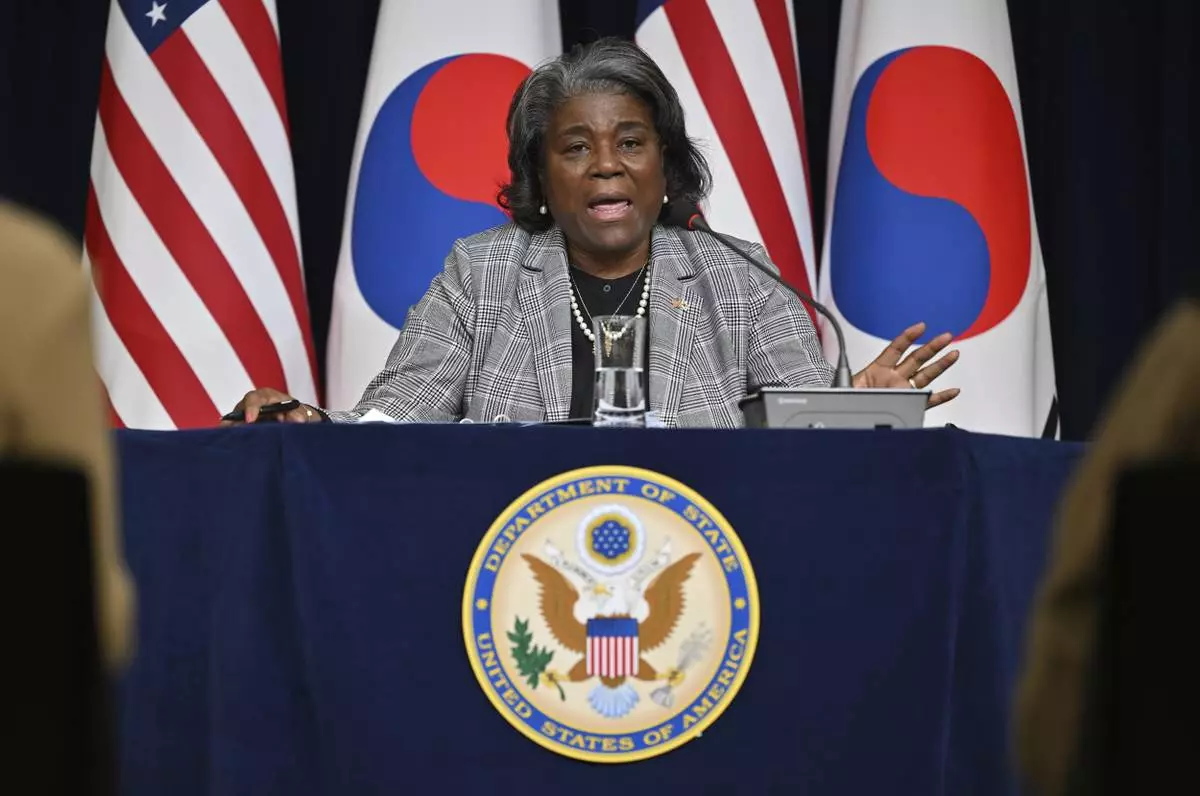
U.S. Ambassador to the United Nations Linda Thomas-Greenfield speaks during a press conference at the American Diplomacy House in Seoul Wednesday, April 17, 2024. (Jung Yeon-je/Pool Photo via AP)
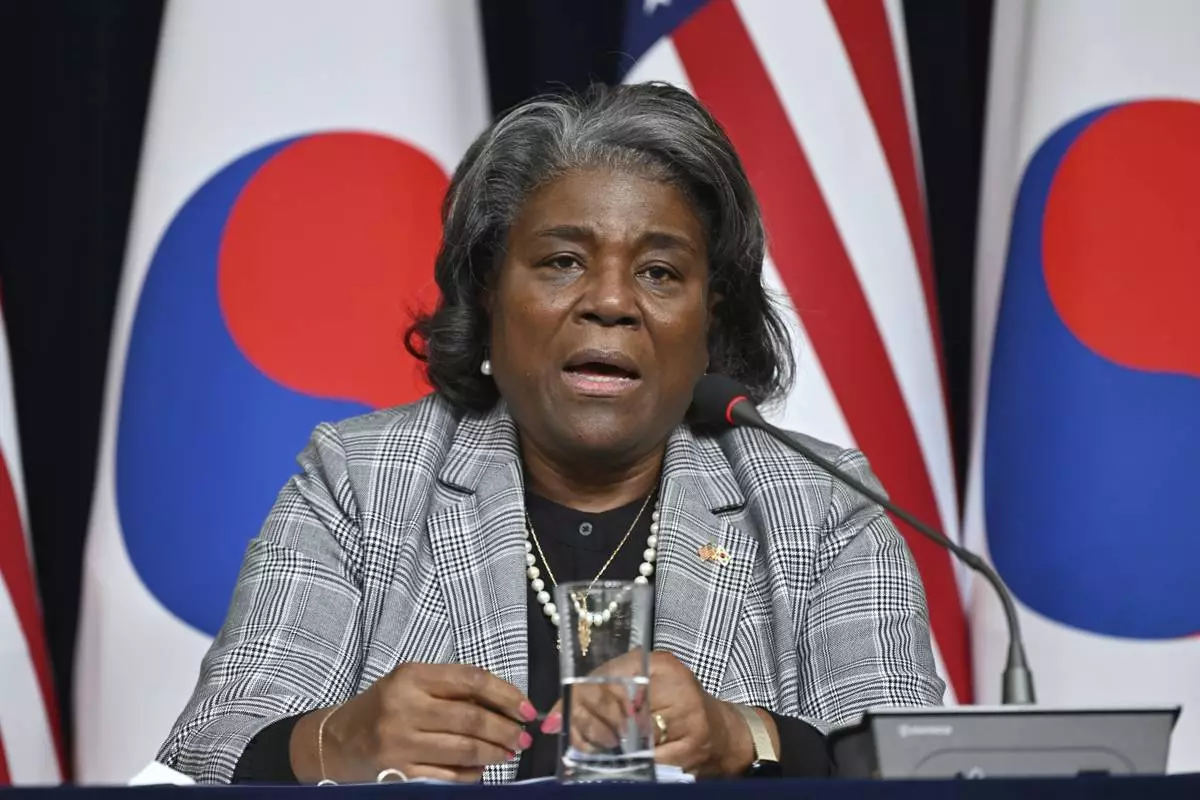
U.S. Ambassador to the United Nations Linda Thomas-Greenfield speaks during a press conference at the American Diplomacy House in Seoul Wednesday, April 17, 2024. (Jung Yeon-je/Pool Photo via AP)


















